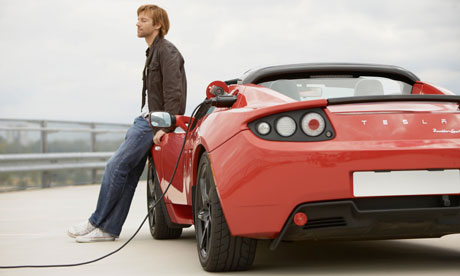
What came first, the electric car or the charging post? That's the chicken and egg question that people have been asking for years and - with most electric car batteries limited to roughly 100 mile ranges - have generally answered with the latter.
Fortunately, charging points are cropping up all over the place, from supermarkets and NCP car parks to roadsides. This Wednesday, electric car charging firm Chargemaster said that it would open a private network of 4,000 total points across 100 cities, dubbed 'POLAR', by the end of 2012. London's public network increased to 400 points last month, and will eventually be increased to 1,300 by 2013.
But despite this slow but steady progress, car-makers are increasingly back-pedalling on the importance of charging points. Most of the major electric car makers I've spoken to recently have been at pains to emphasise they don't think public charging points are important for electric car take-up. Early adopting electric car owners, they argue, will charge overnight and plan their journeys so that the spectre of 'range anxiety' - running out of charge - won't be a problem.
The motoring industry is even cannily repackaging electric cars as second cars, rather than replacements for combustion engine ones. "The majority of charges will be done overnight," said Paul Everitt, chief executive of the Society of Motor Manufacturers and Traders, who recently told the Guardian he assumes that, for many, an electric vehicle will be a second car. "Much of the infrastructure isn't about fulfilling demand – it's about creating reassurance."
This new approach is an admission that even moderately comprehensive charging coverage is still a long way off - and companies like Nissan, Mitsubishi, and Renault have electric models they need to flog now and in the coming months.
For example, the 1,300 points in London are down from an earlier Boris Johnson promise of 7,500, and even more significantly the government made a major U-turn in June on its coalition agreement plans for a national charging network. Justifying its decision to axe the planned network, the DfT said people don't want or need them. The charging points would be "under-utilised and uneconomic", it claimed, adding its research said the majority of owners would charge overnight at home. That's the opposite of what drivers and car-makers have been saying for years.
The reason for canning the charging network is simple: saving government money. Even with private-public partnerships, the cost of the points is not insiginificant - manufacturer Elektromotive tells me a typical kerbside charging point costs between £4,000-5000 to install. Elektromotive's polling, as you might expect, also contradicts the government research: two thirds of people say kerbside charging points would make them more likely to buy an electric car.
The government's decision also ignores the fact that electric cars make the most sense - both in terms of journey types and air pollution - in cities. And, aside from the most affluent and suburban city dwellers, most drivers in cities need kerbside charging points to avoid trailing wires over pavements.
Sure, battery technology is coming along and may one day make public charging points redundant. The Tesla Model S coming to the UK next year will have a range of 160 miles or more, depending on the version you buy. But it'll cost north of £40,000.
Even with new models arriving and predictions of a breakthrough year in 2011, electric car sales are also going slowly in the UK. With just a few hundred cars sold this year, and less than a thousand charging points nationwide, it seems clear we're going to need both more chickens and more eggs.

